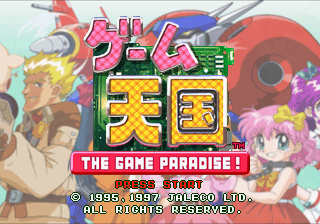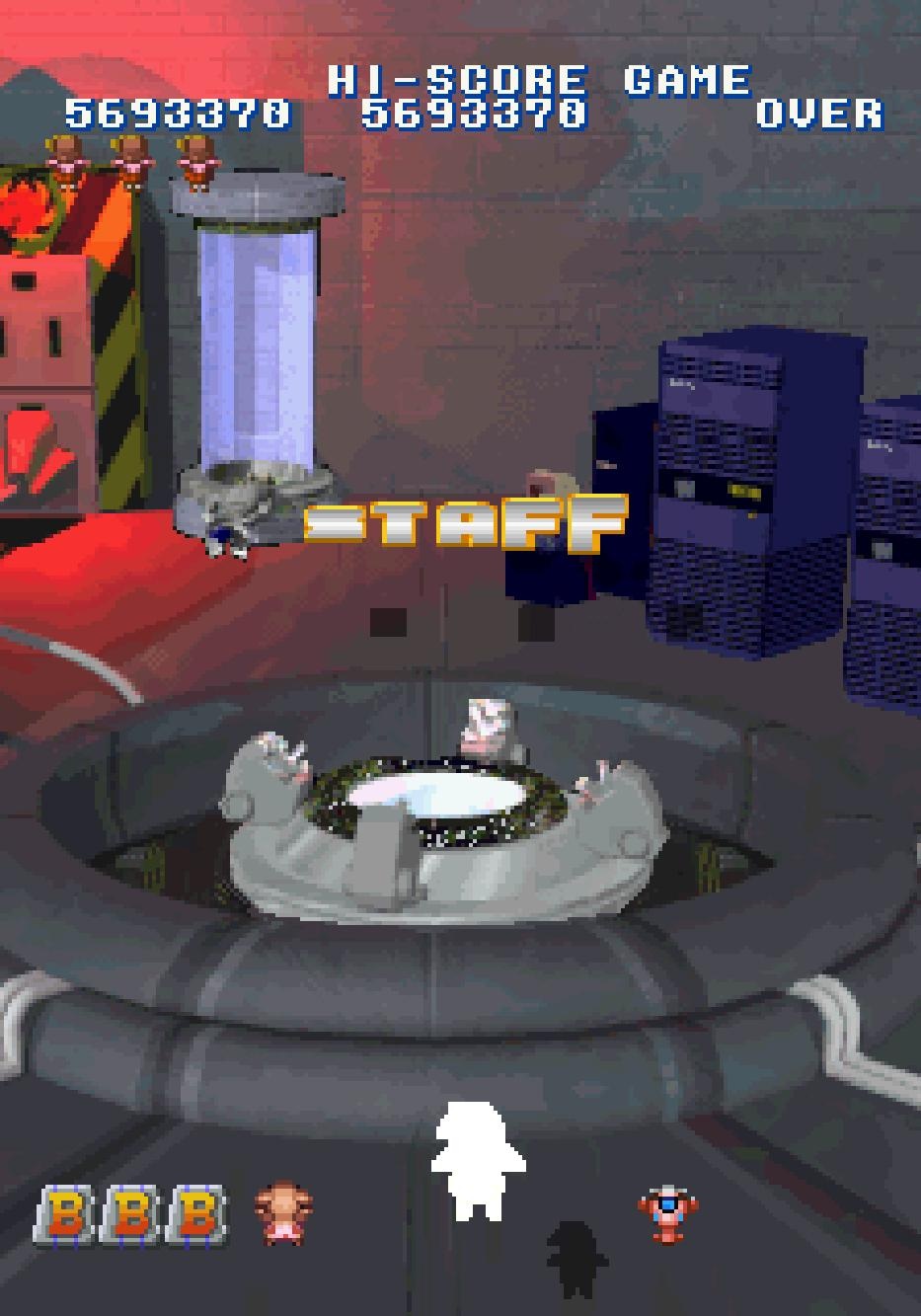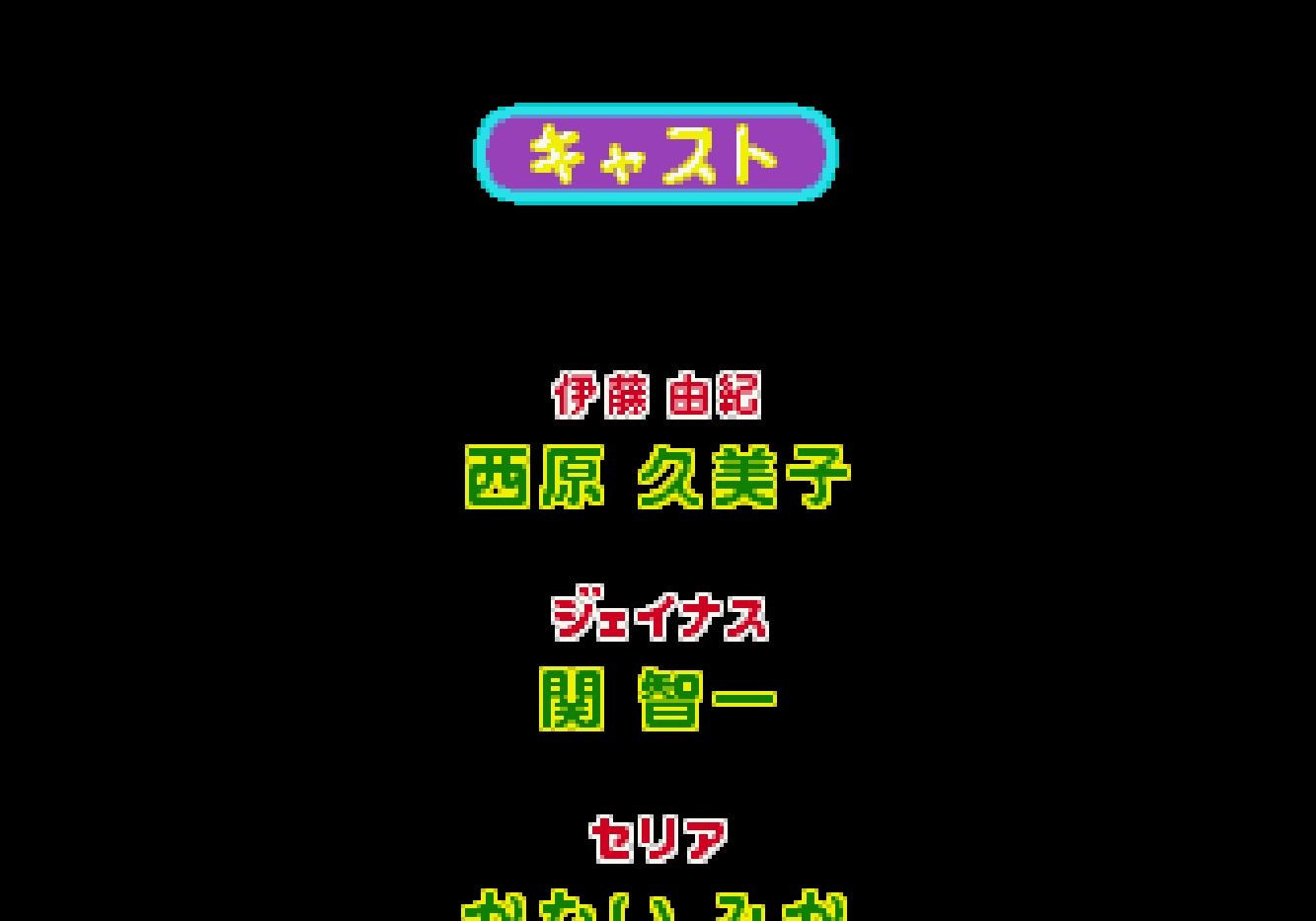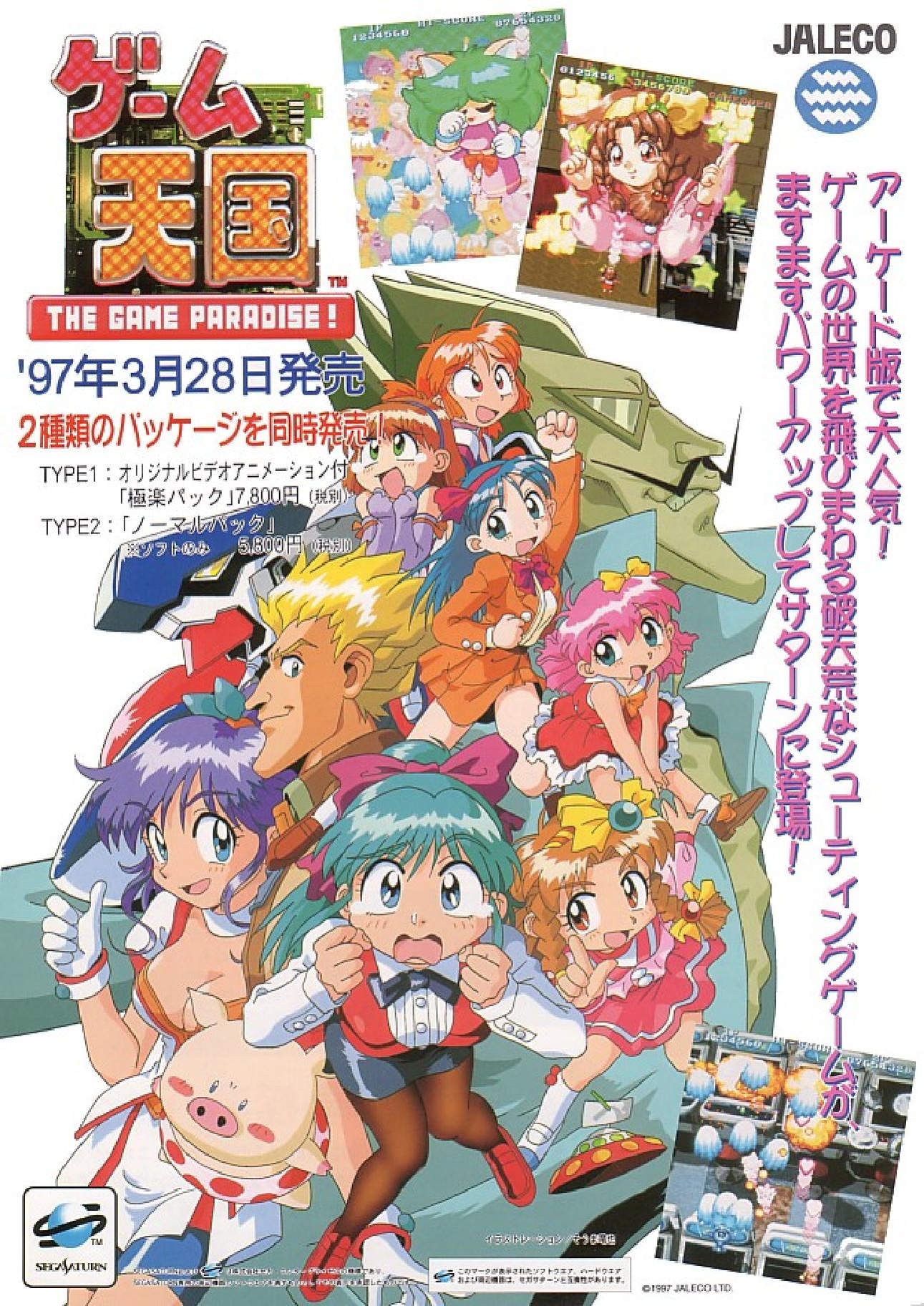Game Tengoku
From Sega Retro
| Game Tengoku | |||||||||||||||
|---|---|---|---|---|---|---|---|---|---|---|---|---|---|---|---|
| System(s): Sega Saturn | |||||||||||||||
| Publisher: Jaleco | |||||||||||||||
| Developer: Jaleco | |||||||||||||||
| Supporting companies: Aoni Production | |||||||||||||||
| Original system(s): Arcade boards | |||||||||||||||
| Sound driver: SCSP/CD-DA (10 tracks) | |||||||||||||||
| Genre: Shooting[1][2] | |||||||||||||||
| Number of players: 1-2 | |||||||||||||||
| |||||||||||||||
|
This short article is in need of work. You can help Sega Retro by adding to it.
Game Tengoku (ゲーム天国) is an arcade vertical scrolling shoot-'em-up by Jaleco that was ported to the Sega Saturn in Japan in 1997.
Contents
Gameplay
Game Tengoku is a Jaleco equivalent to Parodius, featuring characters and settings from older Jaleco games, plus parodies of late-90s Japanese culture. It also makes references to non-Jaleco games, including, for example, Sega's Head-On.
The Saturn port features an "arrange mode" with two new stages. It is also compatible with vertically-orientated screens.
Production credits
Original mode
Staff
- Program Leader: Akiyama Wont You! Nozomu
- Program: Z-Donguri, Benriya Kenchan
- Graphic Leader: Mr.Kamikaze & Mr.Hasegawa
- Graphic Leader: ....Ya....., .....Ei....
- Graphic: Teruhiko Watanabe, Takarod, Af4K
- Sound Edit / Music Compose: Amie
- Music Compose: Kenichi Arakawa
- Voice: Mika Kanai, Hekiru Shiina, Kumiko Nishihara, Shigeru Chiba, Tomokazu Seki
- Cast Management: Ryuuta Ishihara
- Recording: Toshiaki Hoshino
- Recording: Satoshi Yano
- Publicity: Kachisato Morita
- Illustlation: Tatsuya Souma
- Thanks: Ishizaki, Shibu Shibu, You&You Machida, Garesso Tsudanuma
- 2nd Direction: Kazaana Takanori
- Production And Direction: Masahiro Arai
- Thank You For Playing
- We Love Shooting Too
Arrange mode
Cast
- Yuki Ito: 西原 久美子
- Jeynus Starmine: 関 智一
- Seria: かない みか
- Pigu: 大塚 明夫
- Z-DYNE Mk-II: 置鮎 龍太郎
- Momoko: 椎名 へきる
- Miki: 高橋 美紀
- Misato: こおろぎ さとみ
- Katou: 鈴木 真仁
- Nakamura: 伊瀬 久美子
- Genius Yamada: 千葉 繁
Staff
- Character Design: そうま 竜也
- Program
- Main Game Program: 秋山 "ウォンチュー" 望
- Scroll・OP Program: 尾澤 一史
- Voice Demo/Anime/ED/Sound Program: 田村 "せっかくだから" 純一
- Menu/Option Program: 三部 "ゆう" 順一
- Graphic
- Graphic Director/Background/Charactor Select Graphic: 山本 栄吾
- Voice Demo Director/SD Charactor/Rare's Graphic: 高橋 将人 (タカロッド)
- Background/Enemy Graphic: 長谷川 神風 浩司
- Momoko Bomber/Myship Graphic: 渡辺 壱号 てるひこ
- Background/Enemy Graphic: RF4K
- Animation/Opening Graphic: 宮崎 章
- Background/Menu Graphic: AHOY
- Background/Enemy Graphic: 新谷 一樹
- Sound
- Sound Edit/SE/BGM/Sound Director: 西村 "あにぃ" 達也
- BGM: 荒川 "とまぞぉ" 憲一
- Theme Song
- Cooperation: (有)タイムベース, 松原 健夫
- Recording: グリーンバードスタジオ
- Sound
- Recording: セントラル録音株式会社, 星野 敏明, 矢野 さとし, 亀田 亮治
- Cooperation: アーツビジョン, 青二プロダクション, 江崎プロダクション, 劇団21世紀フォックス, 賢プロダクション, 俳協, ぷろだくしょんバオバブ, (アイウエオ順)
- Casting Cooperation: 賢プロダクション, 石原 竜太
- Special Thanx: 大谷 肇, 小栗 功充, 新谷 司, 森田 かちさと, 芦澤 諭, 水谷 卓郎
- Planners
- Planning Support: 奈良 友人
- Planning/Scenario Support: 笠原 太郎
- Planning/Scenario: 風穴 尚紀
- Director/Scenario/Producer: 荒井 正広
Magazine articles
- Main article: Game Tengoku/Magazine articles.
Promotional material
Print advert in Sega Saturn Magazine (JP) #1997-04: "1997-04 (1997-02-21)" (1997-02-07)
Print advert in Sega Saturn Magazine (JP) #1997-18: "1997-18 (1997-06-06)" (1997-05-23)
Physical scans
| Sega Retro Average | ||||||||||||||||||||||||
|---|---|---|---|---|---|---|---|---|---|---|---|---|---|---|---|---|---|---|---|---|---|---|---|---|
|
| 77 | |
|---|---|
| Based on 4 reviews | |
Technical information
- Main article: Game Tengoku/Technical information.
References
- ↑ File:GameTengoku Saturn JP Box Back.jpg
- ↑ 2.0 2.1 2.2 https://sega.jp/fb/segahard/ss/soft_licensee3.html (Wayback Machine: 2019-07-28 12:30)
- ↑ 3.0 3.1 File:GameTengoku Saturn JP Flyer.pdf
- ↑ File:GameTengoku-o_Saturn_JP_SSEnding.pdf
- ↑ File:GameTengoku-a_Saturn_JP_SSEnding.pdf
- ↑ Famitsu, "1997-06-13" (JP; 1997-05-30), page 1
- ↑ Saturn Power, "December 1997" (UK; 1997-10-14), page 82
- ↑ Sega Saturn Magazine, "1997-19 (1997-06-13)" (JP; 1997-05-30), page 165
- ↑ Sega Saturn Magazine, "Readers rating final data" (JP; 2000-03), page 10
| Game Tengoku | |
|---|---|
|
Main page | Comparisons | Magazine articles | Reception | Technical information | |












